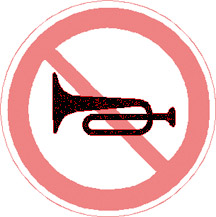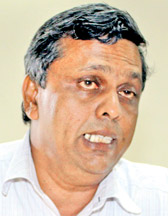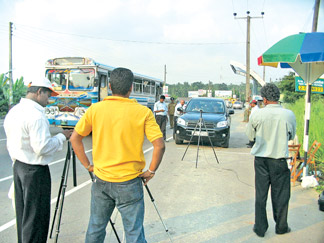Noise pollution - another menace in the making
By Omar RA JARATHNAM JARATHNAM
According to statistics previously shared on March 6 with the Sunday
Observer by the Deputy Inspector General of Police in charge of Traffic
Administration, Road Safety and Western Province Traffic Operations,
Asoka Wijetilleka, nearly 1300 motorists were due to be prosecuted after
being detected within the period from February to March for tooting
their vehicle horns unnecessarily.
A further exercise conducted on April 7 by The Central Environment
Authority (CEA) and the Industrial Training Institute (ITI) resulted in
horns of 250 more vehicles being checked in Malabe on April 7. These
motorists may wonder this issue is being given such importance and why
the authorities deploying staff to detect noise pollution caused by
motorists and if they shouldn't be allocating the same staff to monitor
industrial noise instead?
|

A.S. Pannila |
Industrial noise pollution is monitored stringently and is under
control, Deputy Director, Technical Services of the Industrial Training
Institute A.S. Pannila told the Sunday Observer. "It is the general
public that need to be aware of how they contribute to noise pollution
which is arguably becoming a menace and is proven to be one of the main
pollutants. We conducted a similar exercise in 2005 too but then the
project couldn't take off due to various reasons and it was constantly
postponed. Now we have teamed up with the CEA to detect perpetrators of
noise pollution. Vehicle noise is one of the highest contributors to
noise pollution", he said.
Noise pollution is treated as a serious offence in the developed
countries, industrial, automobile noise or even playing loud music in
your own house could earn you a complaint against noise pollution. The
health repercussions of noise is also often underestimated in the
developing world.
Protesting to noise pollution is actually an indicator of a country's
development because it uplifts the living standards of the country's
citizens, says Pannila. "We are prepared to fight against industrial
noise but we are backwards to fight it in our neighbourhood and the road
especially when the perpetrators are known to us. Fighting noise
pollution should begin from home and then extended to every avenue of
our daily routine", he said.
Q: What were your findings from the operation conducted on April 7?
 A:
We were mainly looking for vehicles that had horns which exceeded the
internationally accepted standards of noise. We tested vehicles from all
categories, there were buses, three wheelers, cars and trucks. We also
had tested brand new vehicles and old vehicles to ensure we conduct the
test across a wide range of automobiles. We found that 90 percent of the
vehicles out of that 250 which had original horns were still within
accepted noise levels but the remaining vehicles failed to meet the
required standards. A:
We were mainly looking for vehicles that had horns which exceeded the
internationally accepted standards of noise. We tested vehicles from all
categories, there were buses, three wheelers, cars and trucks. We also
had tested brand new vehicles and old vehicles to ensure we conduct the
test across a wide range of automobiles. We found that 90 percent of the
vehicles out of that 250 which had original horns were still within
accepted noise levels but the remaining vehicles failed to meet the
required standards.
Q: There is a wide range of loud horns available in the market for
sale though, what can stop vehicle owners from buying them?
A: The packaging in all these noisy air horns clearly state that they
are not suitable for use in the metropolis. This itself can stop them
from buying but it is conveniently overlooked. They are only to be used
in areas known to have wildlife intrusions to deter animals from the
driving path but they are misused now. It is just like using a fog light
in Nuwara Eliya, you use it only if need be and it is illegal to use it
otherwise.
Generating unnecessary noise is a nuisance to others hence everyone
must be educated on avoiding noise pollution. Five to six years back,
smoking in a bus or any other form of air pollution was tolerated but
now people instinctively protest to such perpetrators, we are trying to
promote a similar attitudinal change against noise pollution too.
Q: Have you recommended that a regulation against noise pollution be
implemented?
A: Yes we are finalising the regulation at least by the end of May
and then team up with the Motor Traffic Department and the Police to
implement them accurately. We are reaching out to university students to
help us create awareness about all of these too.
Q: Horns are not the only equipment that cause noise? How about some
bus engines and silencers, they are more irritating than loud horns
A: That is a long-term plan, we need a regulation in place to check
that all components of imported vehicles comply with the internationally
accepted noise levels. The regulation should incorporate the provision
to reject vehicles that do not conform to such standards from entering
the country. It is impossible to check every single vehicle that enters
the country, but I recommend that we devise a type approval system where
vehicles belonging to a particular accepted models are allowed entry
after they show evidence of compliance. Having said that we have been
made aware of buses running especially in the rural areas which use
mufflers on their silencers to enhance the noise so they can be easily
identified by commuters even from a long distance. So both pre-entry
procedures and post-entry procedures will have to be drafted to combat
the issue.
|

A detection program in progress |
The ITI and the CEA once again will have to work closely with the
relevant authorities to detect violators and penalise them. This is
going to be intricate but I am hopeful that we will succeed.
Q: The recommendations are quite optimistic but how can you ensure
the implementation is going to be dealt with the same optimism too?
A: The rapid development that is taking place in the country now will
inevitably leave room for noise pollution, we cannot eradicate it but we
can certainly mitigate it.
The need for strategies against noise pollution is included in the
Mahinda Chinthana too, so it has been foreseen. With the amount of
highways that are scheduled to be constructed, the tyre noise of
vehicles are going to contribute to noise pollution too, so they will be
building concrete pillars to act as noise barriers, perhaps when
constructing highways in the future they may use transparent noise
barriers but this costs money. That is why it is important to educate
people on noise pollution and let them know that even trees help
mitigate noise to a great extent. We have not inculcated the need to
prevent noise pollution so there is a desire to start afresh and we are
taking the lead. The Chairman of the CEA Charith Herath and his Director
General Ramani Ellepola have been instrumental in getting all projects
off the ground relating to fighting noise pollution.
The health repercussions of noise pollution can be quite harmful. If
someone is constantly exposed to noise of over 85 decibels (dB=the
measurement of the intensity of noise) over prolonged durations, they
can be affected by noise induced hearing loss. Heart problems and blood
pressure levels are also subject to the affects of noise pollution.
Mental patients find fluctuating noise levels extremely irritating and
unsettling too and even hospital patients can be affected by noise
pollution.
Automobiles and industries are not the only contributors but night
clubs and other places where music is played aloud are also significant
contributors too.
It is often misconstrued that noise pollution occurs in the city but
rural areas are not exempted from the issue, because the background
noise is very low in these areas, the probability of noise pollution
does not differ significantly from the statistics of noise pollution in
the city.
Many feel that focusing on noise pollution is a petulant state of
mind, but it is not so, we are heading towards economic development and
it will have to reflect in the living standards of our country's
citizens and unless we unite to protest it, we will never escape the
adverse effects of noise pollution. |

